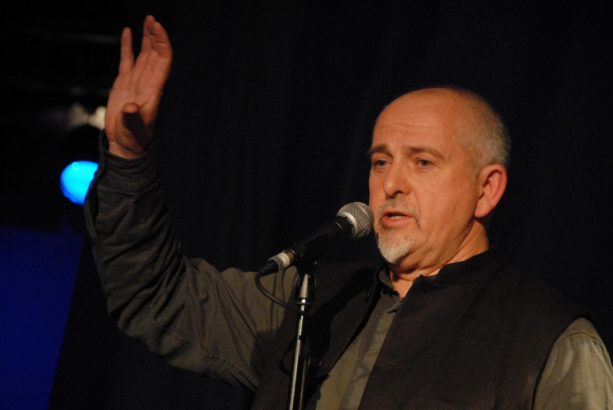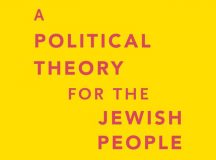100 artists including Ken Loach, Mark Rylance and Susan Sarandon have signed an open letter indicting Israel as an illegitimate ‘settler colonial’ society. Fathom editor Alan Johnson sets out the reasons why it isn’t, in the form of an open letter to one of the signatories, his culture hero Peter Gabriel.
Dear Peter Gabriel,
As a teenager in a cold and grey North Shields in the 1970s one of my treasured possessions was a red hooded sweat-shirt into which my friend Eddie Thomas had sewn the titles of Genesis albums in beautiful, flowing, many-colored silken threads. After school and paper rounds, we’d sit listening to Foxtrot in a bedroom smelling of a sickly sweet joss stick and bathed in the equally sickly light cast by a cheap coloured bulb. (Well, as I say, it was the 1970s, and there was no Joe Strummer yet.) We’d listen to the epic ‘Supper’s Ready’ and hear your voice soaring above Tony Banks’ gorgeous chord progressions, asking ‘Can’t you see he’s fooled you all?’ For me, that is still one of prog’s great transcendent moments.
I was reminded of that question when I saw you had signed the Open Letter calling Israel a ‘settler colonial’ society, akin to the USA, Australia and New Zealand. I think you are mistaken and I want to explain why. I think someone has indeed fooled you all. (Ilan Pappe, probably.) I think many of the signatories think they are on the right side of history and fighting against injustice by endorsing the ‘settler colonialism’ label. It’s one of the victories of BDS; they get well meaning people to support extreme positions. (I leave aside other claims you make in the open letter. It’s the labeling of Israel as a ‘settler colonial’ society I want to disagree with you about. I want to try and persuade you that it’s a deeply unhelpful way to talk about Israel and the conflict.)
‘Settler colonialism’ is a newish way of talking about Israel and Palestine that radically misunderstands the conflict, harms the cause of peace and Palestinian statehood, and aligns western activists, whatever their intentions, with Hamas.
Those pushing the ‘settler colonial’ paradigm tell us it is time to forget talk of ‘two peoples’ being trapped in a tragic and unresolved national question that requires mutual recognition, negotiation and a division of the land into two states. That’s all so last century they say, and just a Zionist ploy anyway. (Pappe explains much in terms of Zionist ploys.)
The new thing is to think of Israel as a ‘settler-colonial society’ like America, Canada, Australia, and New Zealand. The Jews are cast as the ‘white’ settler-colonialists and the Palestinians are given the role of the ‘black’ indigenous. And now it’s all so easy to grasp! The Israel-Palestine conflict is just like Derek Chauvin and George Floyd! The racist white European colonialist Jews, we are told, ‘invaded’ Palestine, a foreign land to them, and they collectively knelt on the neck of the ‘indigenous’ Arabs. Israel is, therefore, a ‘settler colonial society’ and so has no right to exist.
And what’s wrong with this new ‘settler colonialism’ paradigm? Oh, pretty much everything.
Everything one needs to know in order to properly understand the conflict (and so make a useful contribution to its resolution) is erased by the ‘settler colonialism’ label. It misses everything that distinguishes the Jewish return to Palestine from White European Settler Colonialism. Here is a short list of the differences.
First, the intimate Jewish relationship to the land
The ‘settler colonialism’ paradigm misses everything that is historically and religiously distinctive about the Jewish relationship to the land of Israel/Palestine. That relationship is utterly unlike anything you can find in the societies usually identified as ‘settler colonial’. The Jews were returning to a land that had been theirs, in which their religion was born, their temple built, and their Matriarchs and Patriarchs walked. A land that was at the absolute centre of Judaism and Jewish peoplehood. The land from which they had been forcibly expelled. Oh, and to a Jerusalem in which they had been a majority since the 19th century. That’s your first huge difference, right there. If it were only that, that would be enough to make the label ‘settler colonialism’ completely ridiculous, one of those ideas that as George Orwell said, are so idiotic you can only get the intellectuals to believe in them.
But it isn’t only that.
Second, the exceptional history of Jewish persecution
The ‘settler colonialism’ paradigm erases the crushing material weight of Europe’s antisemitic history as a driver in the rise of Zionism and the creation of the Jewish state. See: the collapse of the post-1789 liberal and emancipatory society, the vicious backlash (‘high’ intellectual and ‘low’ popular) against the limited inclusion of Jews in European societies in the late 19th century, and the radicalisation of European antisemitism in the 20th century culminating in the Holocaust.
The Israeli left-wing historian Zeev Sternhell, when demolishing the ‘settler colonialism’ paradigm in New Left Review in 2010 in his superb article ‘In Defence of Liberal Zionism’, pointed out in the bluntest terms to Gabriel Piterburg (one of the architects of the term ‘Zionist settler colonialism’), that Europe had ‘vomited up its Jews’ and Jewish history would go in a particular direction as a result.
Yes, religious persecution drove many onto the Mayflower in 1620, but the exceptional Jewish experience of persecution, over millennia, and culminating in that rupture in world history and Jewish history that was the Shoah, made the creation of a Jewish state in the land of Israel nothing like the creation of the ‘settler colonial’ societies such as the USA or South Africa. Look, there is a reason why the Marxist Isaac Deutscher, in the 1940s and 1950s, called Israel a ‘Refuge State’ to be defended by progressives, and confessed he had been quite wrong to be an anti-Zionist in the 1930s. To call Jews who fled an antisemitic Europe or staggered out of Auschwitz, propping up their skeletal bodies on one another, ‘racist settler colonialists’ is obscene.
Third, Jewish indigeneity
The settler colonialism paradigm erases the local character of many Israeli Jews. Hundreds of thousands of Jews moved to Israel from Arab lands from the late 1940s, moving within a region they had lived in for millennia, and most were driven out of their homelands by Arab and Muslim antisemitism (a huge subject that is routinely ignored or covered over by the advocates of ‘settler colonialism’ such as Pappe, by the way).
They arrived in Israel as refugees, most carrying the one suitcase they had been given 24 hours to pack after millennia of residence. So if it’s indigeneity and persecution you are looking for, here it is. This time on the Jewish side of the ledger. See it plain and you are looking at the very opposite of a ‘white’ ‘European’ ‘racist’ ‘colonialism’. To apply those accusatory labels to that traumatic experience is, once again, obscene.
Fourth, the international community birthed Israel
The ‘settler colonialism’ paradigm erases the facts about a series of international community mandates that nurtured a new Jewish state into being, just as was happening for Arab peoples at the same time in the same region. Again, this League of Nations and United Nations superintendence of the creation of Israel is utterly unlike anything experienced by the ‘settler colonial’ societies. Had the Palestinians done as the Jews did in 1947-1948 and accepted the UN partition plan, instead of starting a war to drive the Jews into the sea and losing it, they would now by celebrating the 73rd anniversary of their own state of Palestine.
So your ‘settler colonialism’ paradigm is analytically useless. It ignores the intimate Jewish relationship to the land, the exceptional Jewish experience of persecution, the inconvenient facts of Jewish indigeneity (and blackness, if we are talking in those terms), and the international community superintendence of the creation of Israel.
I’d add a fifth analytical error to the list. Well, it’s more like a deliberate and shabby trick than an honest intellectual error.
Fifth, the analytical lumping of the ‘settler colonialism’ paradigm
To make their case, the ‘settler colonialism’ pushers knowingly erase the plurality of historical Zionist subjectivities, strategies and policies – left, right, religious, secular – by cherry-picking from history and quote-mining from the archives. Difference between Zionists is rubbed out until what’s left is a ‘typical settler consciousness and imagination’: racist, imperialist, genocidal and so on. All Jews are ‘settlers’ and all settlers are ‘racists’ and ‘genocidists’. Whether the Jew is ‘left-wing’ or ‘right-wing’, a Greater Israel supporter or a partisan of the two state solution, the racist killer Meir Kahane or the Peace now founder and novelist Amos Oz, it matters to them not one jot.
This kind of ‘analytical lumping’ – more like a cynical comms strategy than an honest intellectual analysis – has a terrible political pay-off: the Israeli Jews are written off and energies are devoted instead to monstering Israel abroad. To that fatal temptation even groups such as Breaking the Silence and B’tselem have, in my view, succumbed.
So the ‘settler colonialism’ paradigm is not just analytically useless. It is also politically reactionary.
Activists in thrall to the paradigm are not constructive. They are destructive. They think it is their role to rewind the film of history, ‘smash the settler colonial Jewish state!’, and put in its place a new ‘de-Zionised’ ‘one state’. The Jews – who would soon be a minority in that state – and the Arabs, they tell us, will then live together in peace and harmony. (In today’s Middle East, no less.)
The ‘settler colonialism’ paradigm treats a tragic, and as yet unresolved, national question as if it is a Hollywood movie, with much cheering and booing, sanctifying and anathematising. That’s why, despite your intentions, the ‘settler colonialism’ paradigm is an obstacle to the Palestinian National Movement. As President Biden recently pointed out, the Palestinians must say unequivocally that they acknowledge the right of Israel to exist as an independent Jewish state. The ‘settler colonialism’ paradigm pushes the Palestinians and their allies in the opposite direction, egging them on to take maximalist positions that make a final status agreement impossible.
There are two highly developed and distinct societies, Israeli and Palestinian. Each is based on a powerful sense of national identity and neither is going away, so they must divide the land. (When there are strong desires for national self-determination the one-state idea collapses, the world over, living on only among western intellectuals and activists.) However, to negotiate a division of the land each people needs to feel confident and secure, otherwise it will not make the necessary (and excruciating) compromises needed to make a deal. Each people must feel itself to be understood as a permanent feature of the Middle East. The ‘settler colonialism’ paradigm, and its linked revanchist programme, takes everybody in absolutely the opposite direction. (Yes, there are many in Israel too, of course, who do what they can to make the Palestinians feel they are not a permanent feature of the Middle East, and they too are part of the problem not the solution.)
To end, a word about the alternative. The alternative is to recognise the right to self-determination of both national groups and to pursue the realisation of that right in the form of ‘two states for two peoples’, to be reached in the only way it could ever be reached: peacebuilding, deep mutual recognition, negotiations, compromise, security guarantees and a sharing of the land.
Often the subject of premature obituaries, in truth this ‘two state solution’ is the only solution that has come near to ending the conflict; that has the majority support, even now, of the two peoples; and that has the good will, diplomatic heft – and financing – of the international community. Nothing else has that combination of democratic legitimacy, popular support and international approval. Yes, it is difficult to achieve, the spoilers are determined, and the last inch is, as they say, a mile deep. But no other proposed solution is real-world politics.
Peter, I believe that once decent people stop being fooled by the likes of Ilan Pappe and Ken Loach, stop viewing the conflict through the distorting prism of ‘settler colonialism’, and stop being in thrall to its crude analytical reductions and its reactionary, if beguiling, political simplicities, then they will hope for, encourage, and even be active in promoting peace through an accommodation between the two peoples.






































Fantastic and absolutely on the mark article. Bravo.
Your second difference between Israel and settler-colonialism, oppression of the Jews, is deeply flawed. You do an adequate job of describing European oppression of the Jews in a few paragraphs, but say nothing about the Arab/Muslim world’s oppression of the Jews. This allows observers to accept the first part and say, “yes, Europe did really, really, really nasty things to the Jews, but why should the innocent Palestinians pay the price?”
You have to burst the myth of Jewish-Muslim amity prior to the advent of Zionism. There is as much truth to it is there is to the claim in the “Southern Manifesto” of amity between “whites and negros” before “Brown v. Board of Education” threatened to upend everything. A start would be the pogroms against the Jews of Palestine and other Ottoman lands in the 19th and early 20th centuries. Then get into the regular indignities that those Jews had to accept if they wanted to prevent those pogroms from occurring more often.
Peter Gabriel and his anti-Israel friends make two serious mistakes:
1) They fail to understand that the Palestinians too are responsible for the absence of peace.
They have rejected three peace plans that would have created a Palestinian state within the 1967 borders (2001, 2008, and 2014). One can try to make excuses to justify their rejection of the Clinton parameters in 2001 or Olmert’s offer in 2008, but they are running out of arguments to explain their rejection of the Kerry/Obama framework of 2014.
2) They fail to understand that Zionism is based on universal moral values.
Israel’s founders did not identify as colonialists. This is another far-left canard. Even Ilan Pappe acknowledges that while many early Zionists at the end of the 19th Century identified as colonialists, the Zionist movement distanced itself from colonialism during the Second Aliyah (wave of Jewish immigration to Palestine) of 1904-1914. On the contrary, the main thinkers of socialist Zionism (Bochov, Ben Tzvi, Katznelson) argued that Zionism was a colonization movement without colonialism (a settlement movement devoid of imperialist ideology).
One has the right to disagree with Zionism, but this ideology remains based on legitimate universal moral principles.
1) Israel’s founders argued that if all peoples are entitled to self-determination in their historic homeland, a homeless people like the Jews should be allowed to return home.
2) As for the Arab presence in Palestine, Zionists invoked another universal moral principle: the redistribution of wealth. It argued that the Arabs who were blessed with a vast territory in the Middle East ought to share a part of it with the Jews who were a homeless people (although a Palestinian Arab identity was already taking shape, Arab nationalists subscribed to Pan-Arabism, which aimed to create a united Arab state encompassing all the Arab provinces of the Ottoman Empire). This is also the reason why nowadays the Israeli left opposes the idea of a Greater Israel. It believes that both Jews and Palestinians deserve their own piece of land.
3) By the 1920s, Zionism became a necessity after Western countries closed their doors on Jewish immigration. Hence, Palestine became the only destination left for Jews trying to escape persecution in Eastern Europe.
Those who claim that Jews should have accepted to remain a minority in Palestine are basically saying that only a limited number of Jews should have been saved, as the Arab population in Palestine did not exceed 600,000 in 1917, and 1.2 million in 1948.
There is no straightforward correlation between the Holocaust and the creation of Israel, but plenty of leftists who had no affinity with Zionism such as Richard Crossman, Ralph Miliband, Jean-Paul Sartre, Bertrand Russell, Harold Lasky, Herbert Marcuse, or Isaac Deutscher, supported the establishment of Israel, as in the late 1940s, most people thought that Jews were still in danger – they were still persecuted in Eastern Europe, and Western countries refused to welcome them, including Holocaust survivors.
Nowadays, the chattering classes (especially in the UK) love to say that a Jewish state should have been established in Germany instead of Palestine. No one took this idea seriously back in the late 1940s, as the Israeli society (the Yishuv) already existed with an entire generation of Jews who were born and/or raised in Palestine. Establishing a Jewish state in Europe would have required the displacement of the whole Israeli society. This is why Richard Crossman argued that the return of the Jews to Palestine was no longer a theoretical issue, but a fact on the ground. He thus referred to the partition of Palestine as the “least injustice”.
Obviously, Peter Gabriel, Roger Waters, Susan Sarandon, and Ken Loach (who claims that Zionists were complicit in the Holocaust) dislike such complexity. They don’t even seem to know that colonialism is not a European invention but a global phenomenon. The Arab world stretches from the Persian Gulf to the Atlantic Ocean. That was not achieved peacefully.
What’s more, they have turned the worst victims of White supremacy into the symbol of “White privilege”. I can’t blame them, they must be part of the Guardian’s readership!
Very dishonest letter. Number one it deliberately leaves out the fact that it was the British Empire, probably the greatest super power in the world at the time that colonized Palestine for the Zionist movement and put down the Palestinian war of independence between 1936 and 1939 very brutally. A far larger percentage of the Palestinian male population were killed in this war than English people were killed in World War I.
Bringing in the Holocaust given the horrible victim blaming persecution of the survivors of the Nazi camps by the sadistic and macho Labor Zionists in Israel during it’s first twenty years is also in extremely bad taste, and that is before we get into the fact that historical place of refuge for European Jews was the Islamic world but when that refuge was most needed those doors had been shut by the Zionist movement.
Also the writer says he is in favor of a two state solution, but Israel has always made clear that they would not accept a solution that would see two actual states.
Actually T. Goldstein, you are the one who is being dishonest. To begin with, it wasn’t Britain that laid the groundwork for the reestablishment of a Jewish homeland in the Middle East. It was the League of Nations, the same body responsible for the creation of Iraq, Syria and Lebanon. You appear to have no issues with those states.
Your simple-minded reference to British persecution of Arabs in the 1930s ignores the even worse British racism against Jews. You completely ignore the White Paper, which limited Jewish immigration at the worst possible time – condemning millions of European Jews to death at the hands of the nazis. You also ignore the British indifference to Arab attacks on Jews during the mandate period.
Finally, how on earth you can claim it was the Zionist movement that closed off Jewish refuge in the rest of the Middle East is simply beyond understanding. Did the Zionists orchestrate the Farhud? Or the expulsion of more than 800,000 Jews from the Arab countries surrounding Israel? This is just simply ridiculous.